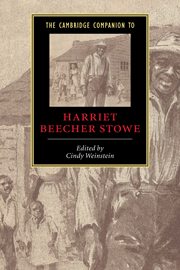Book contents
- Frontmatter
- Introduction
- 1 Stowe and race
- 2 Uncle Tom’s Cabin and the south
- 3 Uncle Tom’s Cabin and the American Renaissance
- 4 Reading and children:Uncle Tom’s Cabin and The Pearl of Orr’s Island
- 5 Uncle Tom and Harriet Beecher Stowe in England
- 6 Staging black insurrection: Dred on stage
- 7 Stowe and regionalism
- 8 Stowe and the law
- 9 Harriet Beecher Stowe and the American reform tradition
- 10 Harriet Beecher Stowe and the dream of the great American novel
- 11 Stowe and the literature of social change
- 12 The afterlife of Uncle Tom’s Cabin
- Select bibliography
- Index
- Series List
8 - Stowe and the law
Published online by Cambridge University Press: 28 May 2006
- Frontmatter
- Introduction
- 1 Stowe and race
- 2 Uncle Tom’s Cabin and the south
- 3 Uncle Tom’s Cabin and the American Renaissance
- 4 Reading and children:Uncle Tom’s Cabin and The Pearl of Orr’s Island
- 5 Uncle Tom and Harriet Beecher Stowe in England
- 6 Staging black insurrection: Dred on stage
- 7 Stowe and regionalism
- 8 Stowe and the law
- 9 Harriet Beecher Stowe and the American reform tradition
- 10 Harriet Beecher Stowe and the dream of the great American novel
- 11 Stowe and the literature of social change
- 12 The afterlife of Uncle Tom’s Cabin
- Select bibliography
- Index
- Series List
Summary
In its frequent and overt legal engagements, Harriet Beecher Stowe's work would seem to offer a perfect subject for scholars examining the connections between law and literature. Uncle Tom's Cabin (1852), A Key to Uncle Tom's Cabin (1853), and Dred: A Tale of the Great Dismal Swamp (1856) advance an anti-slavery conception of American law. In Lady Byron Vindicated (1870), Stowe argues for women's rights, gender equality in marriage, and a more fully contractual conception of marriage in which the duties of both spouses are reciprocal and interdependent. However, with a few notable exceptions, such as Brook Thomas's Cross-Examinations of Law and Literature, scholars have not focused on Stowe's legal preoccupations - how the law influenced Stowe or how Stowe may have influenced American jurisprudence. Stowe scholarship has tended to focus on gender, religion, and sentiment to the exclusion or neglect of the jurisprudential aspects of her writing. Many critics seem to share James M. Cox's view of Stowe as writing “against the law” out of what he calls her “essentially sentimental determination to choose the religion of love over the religion of judgment.” Such accounts take at face value Stowe's characterizations of sentiment as a feminine and sympathetic alternative to law, which is masculine and more concerned with commercial and material self-interest than salvation.
- Type
- Chapter
- Information
- The Cambridge Companion to Harriet Beecher Stowe , pp. 154 - 170Publisher: Cambridge University PressPrint publication year: 2004
- 11
- Cited by



